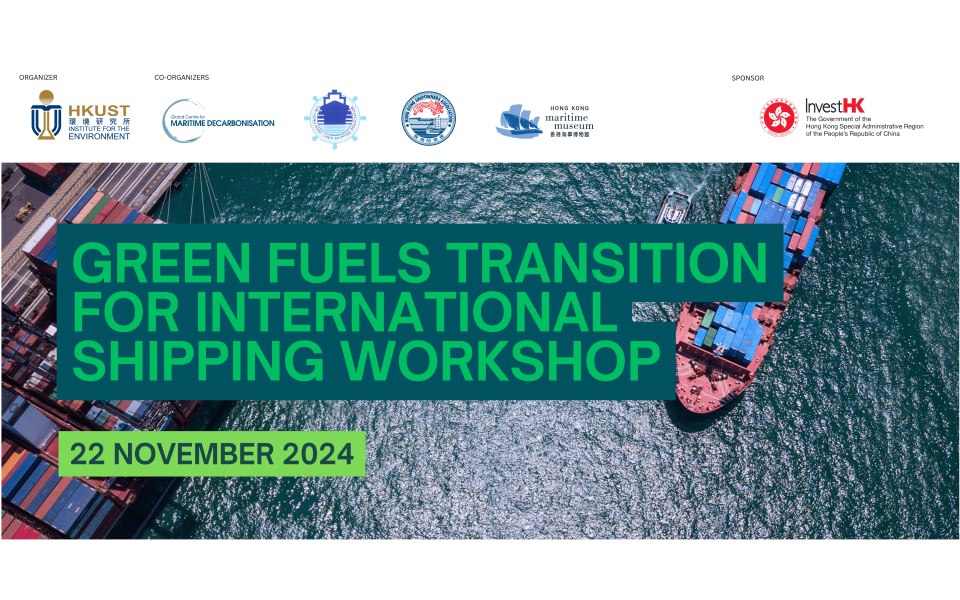Executive Summary
The Green Fuels Transition for International Shipping Workshop, held on 22 November 2024 at Hong Kong Maritime Museum, assessed Hong Kong's strategic positioning amid accelerating regulatory requirements for maritime decarbonization. Coinciding with Hong Kong's Action Plan release, international experts reinforced persistent themes while offering Action Plan-specific recommendations. Asia-Pacific production capacity is expanding rapidly—CEO Frank Yu (Envision Energy) targets 5-7 million tons of green ammonia by 2034, CIMC announces 50,000 tons of green methanol in Guangdong. However, demand activation remains the critical challenge, as Director Martin Cresswell (HK Shipowners Association) emphasized: "We need to create the demand. Basically, governments have got to take action...Without governments, we can't really move forward with these new fuels." Expert insights revealed strategic imperatives requiring research foundation. Managing Director Roberto Giannetta (HK Liner Shipping Association) advocated positioning Hong Kong "as a trading hub for green fuels". Chief Officer Pernille Dahlgaard (Maersk MC-Kinney Center) emphasized fossil fuel users receive "implicit subsidy" requiring carbon pricing to "jump up two or three times." Fleet Management's Prakash Chandra noted Singapore "giving so much grant for green fuel development." The implied research need can be readily seen in the priorities that emerged from expert discussions:
- Conduct fuel demand modelling and government intervention analysis to develop evidence-based strategies for demand creation and green corridor establishment
- Conduct carbon pricing impact assessment to quantify the price acceleration effects needed for decarbonization and inform Hong Kong's policy positioning within evolving regulatory frameworks
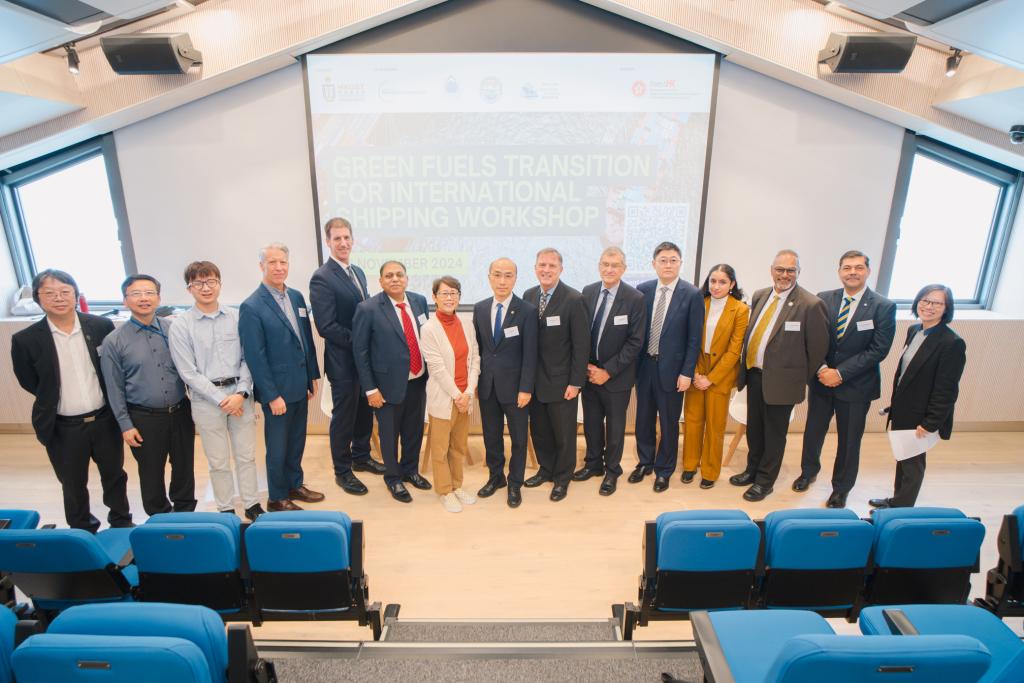
Technical Summary
The Green Fuels Transition For International Shipping Workshop took place on 22 November 2024 at the Hong Kong Maritime Museum, marking the conclusion of Hong Kong Maritime Week 2024. It was organized by the Hong Kong University of Science and Technology, co-organized by Karma Works Foundation, Hong Kong Shipowners Association, Hong Kong Liner Shipping Association, and Hong Kong Maritime Museum, with sponsorship by Invest Hong Kong, reflecting strong institutional support from both academic and industry stakeholders. This workshop was particularly significant as it coincided with Hong Kong's release of its Action Plan on Green Marine Fuel Bunkering just days before the event, demonstrating the government's commitment to positioning Hong Kong as a key player in the maritime energy transition.
The Green Fuels Transition for International Shipping Workshop was distinguished by the participation of maritime industry leaders and stakeholders representing the complete international shipping decarbonization ecosystem. We were privileged to welcome Mr. Qiang Shi, Deputy Director of the Hong Kong Marine Department, who delivered opening remarks outlining Hong Kong's newly published Action Plan on Green Marine Fuel Bunkering.
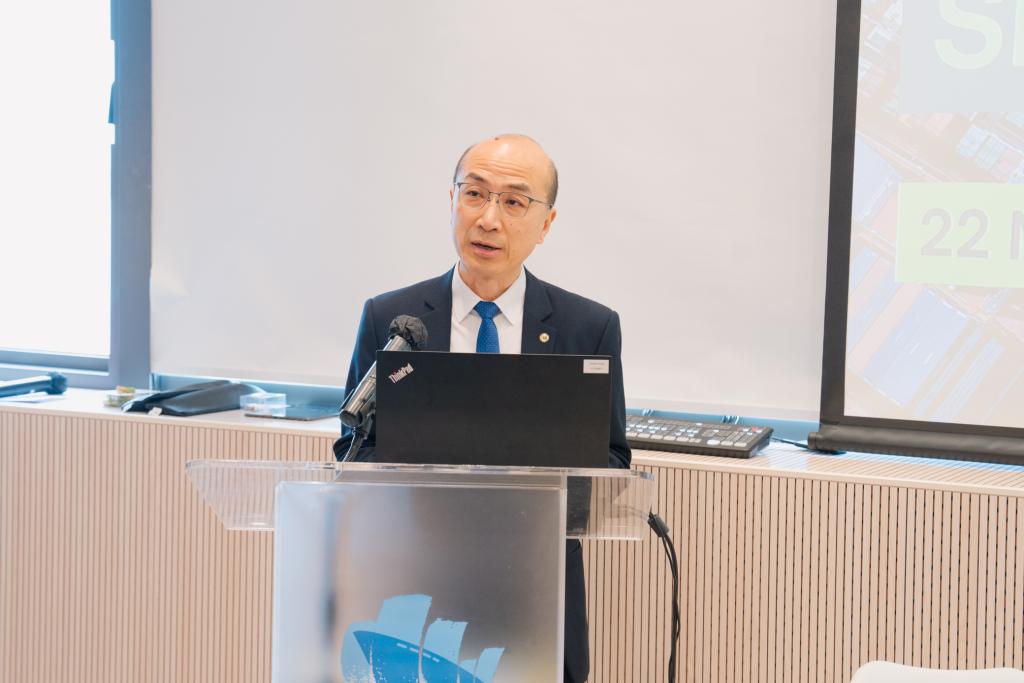
The workshop invited prominent international expertise, including Ms. Pernille Dahlgaard, Chief Officer for Government, Business & Analytics at the Mærsk Mc-Kinney Møller Center for Zero Carbon Shipping from Denmark, and Dr. Sanjay C Kuttan, Chief Strategy Officer at the Global Centre for Maritime Decarbonisation (GCMD) from Singapore, representing leading global maritime decarbonization institutions.
In addition, the event demonstrated comprehensive value chain engagement across multiple sectors: shipping operations were represented by Mr. Martin Cresswell (Technical Director, Hong Kong Shipowners Association and former Board Member of China Navigation Company/Swire Group), Mr. Roberto Giannetta (Chairman, Hong Kong Liner Shipping Association), and Mr. Prakash Chandra (Director Technical, Fleet Management Limited); advanced energy technology and fuel production featured Mr. Frank Yu (Global Vice President, Envision Energy) and Mr. Tony Li (General Manager R&D, CIMC ENRIC); international port authorities and regulatory bodies included Mr. Ian MacMillan from South Coast Air Quality Management District overseeing Los Angeles/Long Beach ports; maritime training and standards development was represented by Mr. Aalok Sharma (Group Head of Training, Anglo-Eastern Ship Management managing 730+ vessels globally) and Ms. Alishba Zaman (Project Coordinator, Maritime Just Transition Task Force, UN Global Compact); and academic research institutions contributed through Prof. Christine Loh (Chief Development Strategist, HKUST Institute for the Environment) and Prof. Alexis Lau (Head, Division of Environment and Sustainability, HKUST).
The workshop featured comprehensive technical presentations addressing critical green fuel transition aspects. Mr. Martin Cresswell outlined IMO's ambitious 2023 strategy requiring 70-80% emission reductions by 2040, while Ms. Pernille Dahlgaard emphasized the critical gap between projected green fuel demand and current production capacity. HKUST's Mr. Jiajing Chen demonstrated AI-powered shipping emission analysis identifying high-traffic green corridor routes, and GCMD's Dr. Sanjay Kuttan shared Clean Energy Marine Hub strategies for connecting green electricity production with fuel delivery.
Envision Energy's Mr. Frank Yu showcased substantial ammonia supply capabilities from their Inner Mongolia facility producing 5 million tons annually, while Fleet Management's Mr. Prakash Chandra detailed practical ammonia ship preparation through the SABRE consortium. CIMC's Mr. Tony Li contributed methanol production insights, and Mr. Ian MacMillan presented critical research on alternative fuel emissions monitoring. The session concluded with comprehensive crew training presentations from Mr. Aalok Sharma and Ms. Alishba Zaman, addressing the essential human element in safe alternative fuel operations.
The discussions revealed the multifaceted nature of international shipping's green fuel transition, emphasizing the critical interplay between technological readiness, regulatory frameworks, and collaborative stakeholder action to achieve Hong Kong's maritime decarbonization objectives.
Green fuel production capacity is rapidly scaling in Asia-Pacific, with substantial supply commitments from mainland China, though demand creation remains the fundamental challenge. Understanding the massive scale and complexity of maritime fuel demand is fundamental to realistic transition planning. Envision Energy demonstrated capabilities targeting 5-7 million tons of green ammonia annually by 2034, while CIMC ENRIC announced 50,000 tons of green methanol production coming online in Guangdong. However, participants consistently emphasized that government intervention and policy frameworks are essential to stimulate market demand, with the IMO's mid-term measures expected by 2027 being crucial for establishing carbon pricing mechanisms.
Shipping's future requires a multi-fuel ecosystem approach rather than single-fuel solutions, necessitating sophisticated port infrastructure across different vessel types and trade routes. Container liners operating on European routes face different fuel preferences compared to regional services, while bulk carriers and tankers have distinct requirements. Port infrastructure must accommodate multiple bunkering systems, storage facilities with varying specifications, and safety protocols tailored to each fuel type, requiring strategic coordination between terminal operators, bunker suppliers, and regulatory authorities.
Safety frameworks and workforce readiness represent critical enablers, with comprehensive training programs being developed industry-wide. The UN Global Compact's Maritime Just Transition Task Force revealed that up to 800,000 seafarers require retraining by the mid-2030s. GCMD's pioneering ammonia ship-to-ship transfer operations demonstrated that these fuels can be handled safely with proper procedures, though operational complexity significantly exceeds conventional fuel handling.
Hong Kong's positioning as a regional green marine fuel hub depends on enhanced policy ambition, infrastructure investment, and credibility-building measures leveraging proximity to mainland production capacity. While participants welcomed the government's Action Plan on Green Marine Fuel Bunkering, industry stakeholders advocated for more aggressive targets and innovative compliance mechanisms. The workshop emphasized that port credibility—exemplified by Singapore's transformation through mandatory mass flow meters—is essential for attracting international shipping business.
Panel Discussion: Getting HK ready for new fuels and new opportunities, including GBA collaboration and trading
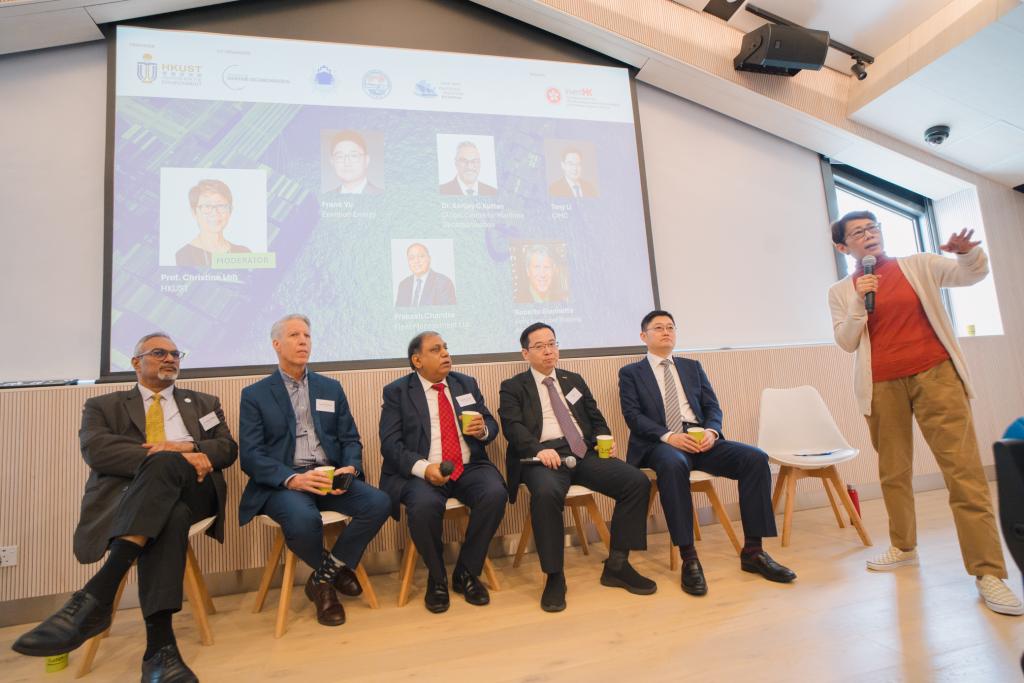
Prof. Christine Loh (HKUST) was the moderator of the Panel which addressed three major themes detailed as follows.
Supply and Demand Dynamics
- Mr Frank Yu (Envision Energy) highlighted significant opportunities in green ammonia production, noting that "handling air, which has zero cost" makes the Asia-Pacific region, led by China and India, well-positioned for competitive green ammonia. He differentiated between bio-methanol and e-methanol, favouring e-methanol due to challenges in handling biogenic CO2, and emphasized that "if costs for producing green molecules could be reduced effectively, there might not be a need for long-term agreements, as the products could be sold as commodities.
- Mr Tony Li (CIMC) presented a contrasting perspective on methanol production routes, stating that "biomass methanol exhibits clear cost advantages" and highlighted China's abundant biomass resources of "over one billion tons of agricultural and forestry waste." He emphasized that from a cost-competitiveness perspective, biomass methanol is currently the most viable option for industrial-scale production.
- Mr Martin Cresswell (HKSOA) stressed that "without government support, the advancement of new fuels would be challenging" and emphasized the need for government action to create demand and the IMO to provide midterm incentives to offset fuel costs.
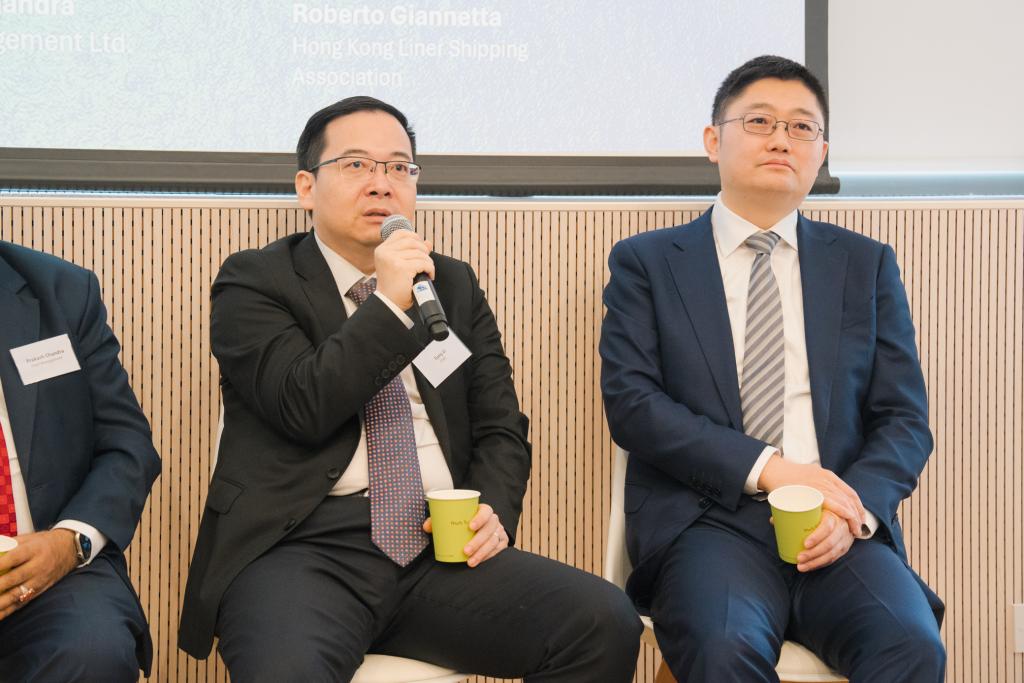
Infrastructure and Operational Challenges
- Mr Sanjay Kuttan (GCMD) addressed port infrastructure adaptation, emphasizing that "operational efficiency is critical" and that ports must analyse different fuels and vessel types. He noted that "simultaneous bunkering and cargo operation is essential for container liners" but warned that "conducting simultaneous operations with ammonia fuel requires extensive safety analysis due to toxic risks."
- Mr Roberto Giannetta (HKLSA) highlighted Hong Kong's service limitations, noting that "large 20,000 TEU vessels bound for Europe are not part of the services offered in Hong Kong." He stressed the importance of attracting regional services and pointed out that "multi-storage solutions would be necessary, explaining that storage tanks for conventional fuels may not be suitable for LNG but could be for methanol."
- Mr Prakash Chandra (FML) countered concerns about readiness, stating "there are already established worldwide bunkering practices for LNG and methanol" with sufficient guidelines available from organizations like IAPH, Lloyd's, and DNV.
Future Market Development and Collaboration
- Roberto proposed that "Hong Kong should position itself as a trading hub for green fuels, leveraging its advantages in financial institutions, legal systems, and infrastructure" rather than focusing solely on bunkering operations.
- Sanjay suggested managing the transition through blending strategies, explaining that "by blending grey and green fuels, it is possible to lower costs while still meeting compliance requirements" and identified biofuels as "the most accessible option for today's market."
- A participant from ExxonMobil emphasized the importance of credibility, sharing Singapore's experience where the 2013 Mass Flow Meter regulation transformed the market by attracting major corporations. She stressed that "establishing credibility should be a priority moving forward" for Hong Kong to compete effectively.
- Christine concluded that the gathering served as "a valuable networking opportunity" and emphasized the importance of experiential learning, stating that "while theories exist, practical trials and courageous policymakers are essential for developing effective demonstrations and working out the details." She noted the presence of early movers in alternative fuels debating commercial viability, suggesting that "over time, the cost structures of these alternatives are likely to converge."
Event Intro
The Hong Kong Special Administrative Region (HKSAR) is positioning itself as a leading bunkering hub for near zero and zero emission (ZNZ) fuels. The first step, bunkering of liquefied natural gas (LNG), is expected to be ready soon. HK’s bunkering hub for fossil fuels is well established and is the 7th largest globally, meeting the dual demand of ocean-going vessels (OGV) calling at the port and also for ships that bunker outside port limits (OPL). HK could also be a transhipment trade in these new fuels.
All forecasts for the shipping sector’s future energy mix, due to regulatory pressures of the EU ETS scheme, the upcoming FuelEU Maritime plus the International Maritime Organization (IMO)’s mid-term measures, suggests that Green Methanol and Ammonia will account for a substantial share of the ZNZ fuels.
To this end, the Institute for the Environment of the Hong Kong University of Science & Technology (HKUST) in support of the HKSAR Government (HKSARG), is organizing a Green Fuels Transition for International Shipping Workshop. This will be of interest to many maritime stakeholders, Shipowners, Bunker suppliers, Fuel storage facilities, Berth owners and various Government Departments, etc.
The Green Methanol OGV Workshop on 22 October has shown that Green Methanol bunkering is coming. Noting that engine manufacturers have been testing ammonia engines at the final stage and solutions are being developed in collaboration with Ammonia Consortiums in Singapore and North America on NH3 bunkering infrastructure and public readiness, the future demand for Green Ammonia bunkering is assured. The workshop aims to facilitate early adoption of Green Ammonia bunkering in Hong Kong, explore the city’s potential role in supporting the scaling up of global ZNZ fuel supply and a platform to foster collaboration among stakeholders to create a unified plan for advancing green fuels in HK.
Sponsor: InvestHK, HKSARG
Notes: Free Admission. Limited seats. Organizer has full discretion to limit registrants per company or decline registration. The event will be video-recorded and uploaded to internet for global coverage.
Disclaimer: The views expressed by speakers or moderator do not necessarily reflect the official policies of HKUST, supporting organizations or the sponsor, nor does mention of commercial practices or companies imply endorsement of HKUST, supporting organizations or the sponsor.
(Preliminary, subject to change)
| Time | Sessions | Speakers | Presentation |
| Part I | Preliminaries (60") | |||
| 0900 - 0915 |
Welcome Opening Speech/ Photo-taking |
HKUST Marine Department (MD) |
|
| 0915 - 0925 | Current Status of Energy Transition in International Shipping | HKSOA | [PDF] |
| 0925 - 0935 | Securing zero-emission fuel supply to facilitate net zero transition (video record) | Mærsk Mc-Kinney Møller Center for Zero Carbon Shipping (MMMCZCS) | NA |
| 0935 - 0940 | Implications and Way Forward of HKUST Shipping Emissions Research Project | HKUST | [PDF] |
| 0940-0950 | How the Clean Energy Marine Hub contribute to green fuels (GF) trading and GCMD’s perspective around the maritime energy transition | GCMD | [PDF] |
| 0950-1000 | Monitoring and verifying OGV emissions using Alternative Fuels | South Coast Air Quality Management District (SCAQMD) | [PDF] |
| Part II | Infrastructure Planning (75”) | |||
| 1000 - 1010 | Green NH3 production and supply | Envision Energy | NA |
| 1010 - 1020 | Solutions Developed in Collaboration with Ammonia Consortiums in Singapore and East coast of America on NH3 Bunkering Infrastructure and Public Readiness | Fleet Management Ltd. HK (FML) | [PDF] |
| 1020 - 1030 | Proposal to HKSARG on Roadmap to GM Bunker and Trading Hub | HKUST Consultant | [PDF] |
| 1030 - 1115 | Panel and Open Floor Discussion – Getting HK ready for new fuels and new opportunities, including GBA collaboration and trading |
HKUST (moderator), HKLSA, Envision Energy, GCMD, CIMC, FML |
[PDF] |
| 1115 - 1135 | Break (20”) | ||
| Part III | Ammonia Bunkering (90”) | |||
| 1135 - 1145 | Preview of training competencies on future ammonia, methanol and hydrogen fuelled ships for the Maritime Just Transition Task Force | United Nations Global Compact (UNGC) - Ocean Stewardship Coalition (OSC) | [PDF] |
| 1145 - 1205 | Share insight from the Ammonia Bunkering Safety Study (Phase 1) | GCMD | [PDF] |
| 1205 - 1220 | Crew training, preparedness and procedures for handling Ammonia fuelled ships | Anglo-eastern Ship Management (AE) | [PDF] |
| 1220 - 1245 | Discuss preparation for Table-top exercise and Ammonia Ship-to-Ship Transfer (Phase 2) | GCMD | [PDF] |
| 1245 - 1255 | Q&A Session | ||
| 1255-1300 | Closing Remarks | HKUST | |
*Due to confidentiality requirements, some presentation slides have been omitted at the speakers' request.*
(in order of speakers' appearance)
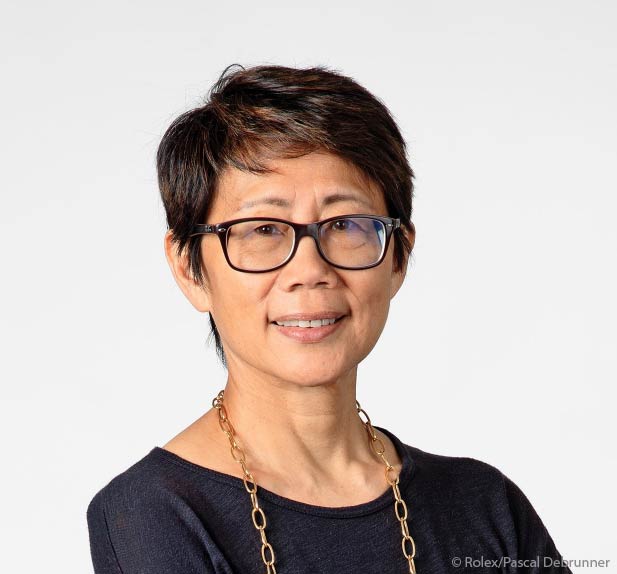
Prof. Christine Loh
Prof. Christine Loh is the Chief Development Strategist at the Institute for the Environment, Hong Kong University of Science and Technology (HKUST). Previously, she held the positions of Special Consultant to the Office of the Chief Executive of the HKSAR Government on the ecological civilization aspects of the Greater Bay Area Outline Development Plan (2019-2020); and Under Secretary for the Environment in the HKSAR Government (2012-2017). She was the CEO of Civic Exchange, an independent non-profit public policy think tank (2000-2012). Before that, Prof. Loh served as a member of the Hong Kong Legislative Council, first appointed in 1992 and later elected in 1995 and 1998. Earlier, she spent 14 years in the private commercial sector in commodities trading. Currently, she is a Director of New Forests Pty Limited, Towngas Smart Energy Company Limited, CDP Worldwide, and Global Maritime Forum. She is also a founding Advisor to Hong Kong Green Finance Association.
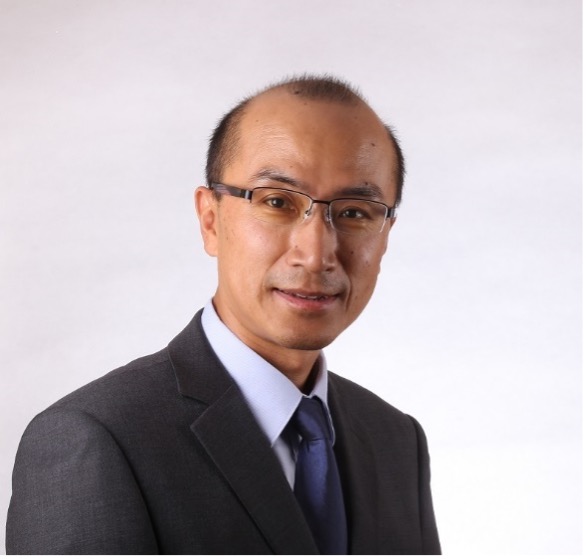
Mr. Qiang Shi
Mr. Shi currently serves as the Deputy Director of the Hong Kong Marine Department, where he leads the Local Vessels and Examination Division, Multi-lateral Policy Division, Port Control Division, and Shipping Division. Mr. Shi began his career onboard container ships as a deck officer. After obtaining his Master Mariner qualification, he transitioned ashore and held managerial positions with major shipping companies, focusing on crew manning and marine operations. In 2007, Mr. Shi joined the Marine Department as a government surveyor. Throughout his tenure, he has handled a diverse range of responsibilities, including port state control, flag state administration, marine legislation, seafarers training and certification, and local vessel safety, among others.

Mr. Martin Cresswell
Martin is a Marine Engineer who has over 40 years’ experience, operating, managing and building merchant ships. He was a Board Member of the China Navigation Company, a British Shipowner, part of the Swire Group, for 15yrs before retiring in November 2016. Martin is currently the Technical Director of the Hong Kong Shipowners Association and continues to work in shipping in various technical roles.
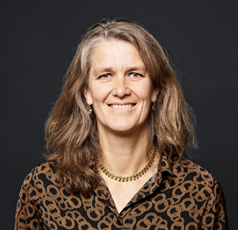
Ms. Pernille Dahlgaard
Pernille Dahlgaard is an international business executive with over 25 years of leadership experience, currently serving as Chief Officer of Government, Business & Analytics at the Mærsk Mc-Kinney Møller Center for Zero Carbon Shipping. Here, she leads efforts to drive sustainable shipping through strategic planning, data analysis, and regulatory work. Having lived in six countries, she has extensive international experience in maritime industry transformation and innovation. She serves on multiple boards for established companies, startups, and social corporations, while also mentoring INSEAD students and alumni as an Entrepreneur-in-Residence. In her current role, she focuses on bridging government and private sector collaboration to advance sustainable shipping solutions.

Mr. Jiajing Chen
CHEN Jiajing is a PhD student in the Division of Environment and Sustainability (ENVR) at the Hong Kong University of Science and Technology (HKUST). He holds a master's degree in international shipping management, also obtained in Hong Kong, and has gained substantial experience in the shipping industry across both Mainland China and Hong Kong. His research and professional interests are centered on green and sustainable shipping practices, with a particular focus on the application of big data in the shipping industry.
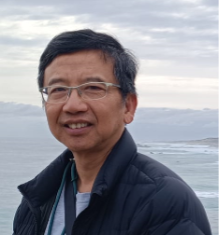
Mr. Billy Cheung
Billy Cheung serves as Director of Environmental & Energy Consulting and currently consults for HKUST's Shipping Decarbonization Project. With over 40 years of experience, he began his career at the Electrical & Mechanical Services Department before spending 10 years at Shell HK Co. Ltd., where he managed Oil Terminal and LPG Engineering operations. From 1997, he served in the Environmental Protection Department, focusing on various environmental initiatives including ozone protection, GHG emission control, electric vehicle promotion, and marine emissions policy. His notable work includes overseeing HKUST's Marine Vessels Emission Inventory study, supporting the Fair Winds Charter, and implementing the Marine Light Diesel Regulation.
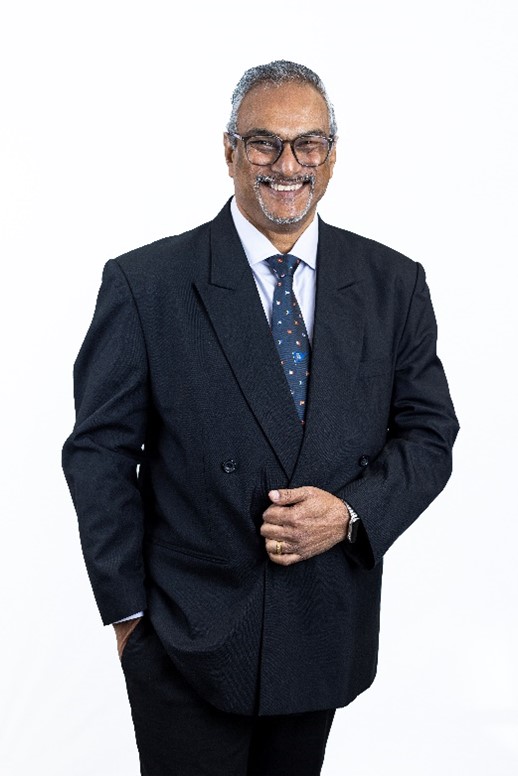
Dr. Sanjay C Kuttan
Dr. Sanjay C Kuttan serves as Chief Strategy Officer at the Global Centre for Maritime Decarbonisation (GCMD). Working alongside the CEO and Chief Projects Officer, he shapes the centre's strategic vision, analyzes market trends, and develops projects addressing maritime decarbonisation challenges. Previously GCMD's Chief Technology Officer until April 2024, Dr. Kuttan had also served as Executive Director of the Singapore Maritime Institute. He holds key positions on various boards including the Chemical Standards Committee Singapore Standards Council, Sustainable Energy Association of Singapore, and MTI's Pro-Enterprise Panel. Dr. Kuttan earned his Ph.D. in Pharmacology from the National University of Singapore.

Mr. Ian MacMillan
Ian MacMillan is an executive at the South Coast Air Quality Management District, overseeing air quality improvement in the greater Los Angeles region, which encompasses 162 cities and 17 million residents. The area, featuring the Ports of Los Angeles and Long Beach, 1.5 billion square feet of warehousing, and extensive rail and highway networks, serves as America's primary Pacific trade gateway. During his 15-year tenure, MacMillan has focused on reducing air pollution from goods movement and industrial sources, which account for half of the region's smog-forming emissions. He leads initiatives to meet federal air quality standards and develops regulatory actions for warehouses, ports, airports, and rail yards.

Mr. Frank Yu
Frank Yu is Global Vice President of Envision Energy and leads Envision Hydrogen as head of Power to X business. In this role, he oversees zero carbon gas and hydrogen energy operations, working across divisions including Envision Energy, AESC, and Envision Digital to deliver solutions to customers, industry parks, and governments. Previously, Yu served as vice president of China at Air Products, where he was General Manager of Central and Eastern China and Hydrogen Energy Business. He began his career as a machinery and mechanical design engineer at a state-owned company. Yu holds a bachelor's degree in Chemical Equipment and Machinery from Nanjing Chemical University and an MBA from Maastricht School of Management through Nanjing University's International Business School.

Mr. Prakash Chandra
Prakash Chandra is a seasoned expert in the marine industry with 34 years of experience. Currently the Director Technical at Fleet Management Limited in Hong Kong, he holds a Bachelor of Engineering in Marine Engineering from DMET India, a Diploma in LNG Shipping from the University of Portsmouth, and has completed Executive Education in Business Management at NUS Business School, Singapore. Chandra's career includes 12 years at sea, 2 years as a Marine Surveyor with ABS, and 20 years as a Vessel Manager. He specializes in the technical management of specialized fleets such as LNG, LPG, and various tankers, as well as new building supervision. Notably, he led projects on methanol-fueled vessel operations and ammonia as fuel. Actively engaged in zero-carbon shipping initiatives, Chandra collaborates with international consortiums like SABRE, RADIUS, and WAVE, and serves on the Gas Committee at Intertanko, promoting sustainability in the industry.
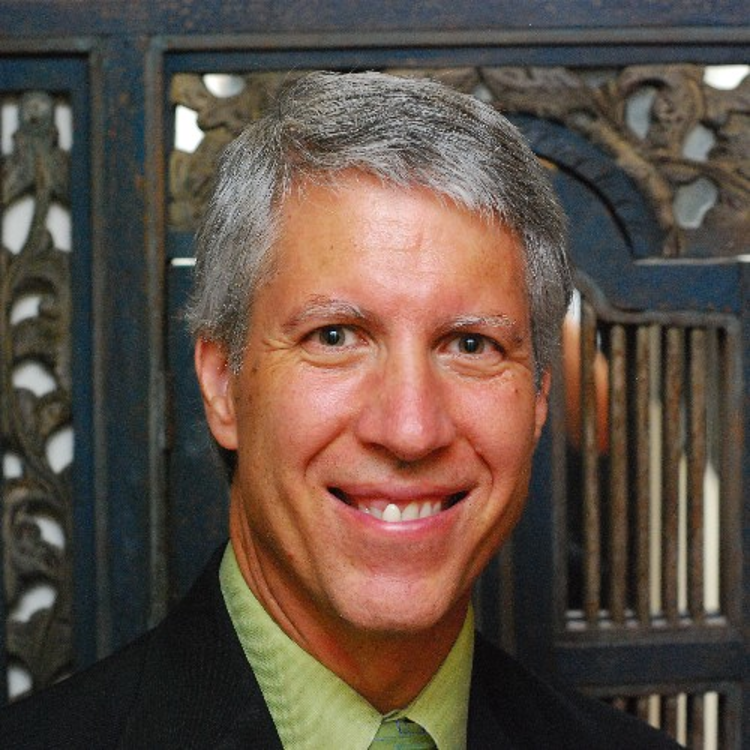
Mr. Roberto Giannetta
Chairman at Hong Kong Liner Shipping Association. Industry veteran with 30 years experience advising and representing container liner interests on operational, safety, environmental, trade, and regulatory matters. Roberto is a consummate team-player with strong articulate and persuasive communication skills, broad international and multicultural experience in Asia, Europe, North and South America, multi-lingual (English, Italian, Portuguese, and conversant in Chinese and Spanish), strong leadership skills, and passionate about service relationship building. Originally from Brazil of Italian parents, educated in Europe and US, and building a career in Asia since 1986, Roberto understands the dynamics of cross-cultural business relationships, how to communicate and lead in diverse settings, and ultimately, how to "get the job done".
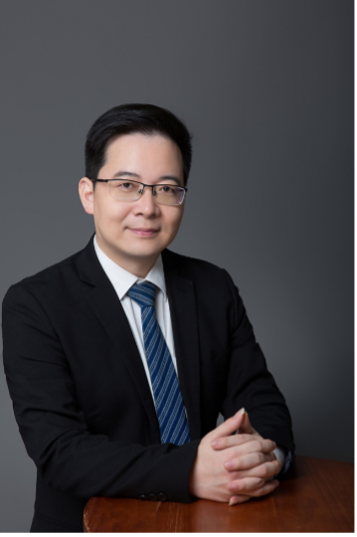
Mr. Tony Li
Tony Li leads sustainable energy innovation as General Manager of R&D at CIMC ENRIC and heads Sustainable Fuel Industry Development at CIMC Group. Currently managing CIMC Green Energy in Zhanjiang, he brings extensive experience from executive positions at SANY Group and China Energy Engineering Group Corporation. A Shenzhen Leading Talent and holder of a Master's from Wuhan University of Science and Technology, Li serves as Vice Chairman of SAC/TC262/SC8 and Committee Member of CSBTS/TC40/SC6. His innovative work is reflected in 41 patents and two China National Patent Excellence Awards.

Ms. Alishba Zaman
Zaman is the Project Coordinator of the Maritime Just Transition Task Force representing the UN Global Compact. I studied Politics and International Relations in London graduating with First Class Honors in 2022. The focus of my dissertation for my undergraduate degree was seafarer captivity and abandonment. I completed an internship with the Sustainable Transport Team at the International Transport Workers’ Federation (ITF) prior to joining the UNGC Ocean Stewardship Coalition.
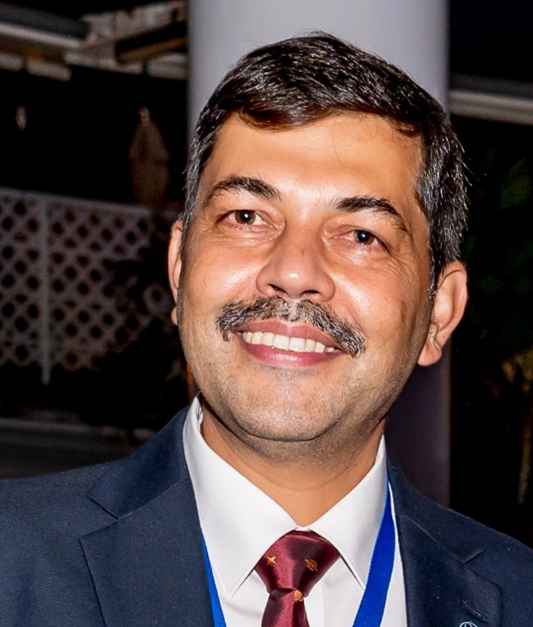
Mr. Aalok Sharma
Aalok Sharma serves as Group Head of Training at Anglo-Eastern Ship Management, which manages over 700 vessels and employs 37,000 seafarers globally. With 15 years of sailing experience, he achieved his command in 2008 before transitioning to shore-side management in 2011. He has held several key positions within Anglo-Eastern, including Quality Assurance manager for the dry fleet, Senior QA and Training manager for the offshore fleet, and Group Director Quality Assurance. Actively involved in industry organizations, Sharma chairs the Nautical Institute Hong Kong Branch and serves on HKSOA's Marine Personnel, Education and Training sub-committee. He is also a GlobaMET member with particular interest in human potential development.
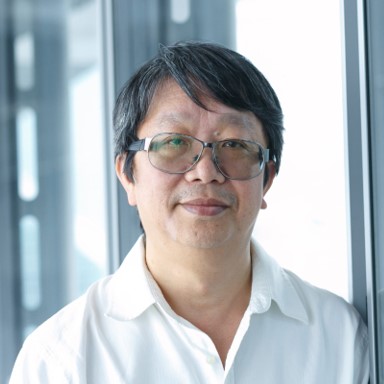
Prof. Alexis Lau
Prof. Alexis Lau, JP, is Head and Chair Professor of Division of Environment and Sustainability, Chair Professor of Department of Civil and Environmental Engineering, and Director of the Institute for the Environment at Hong Kong University of Science and Technology.
Prof. Lau specializes in air quality and health exposure, weather and climate, and environmental policies, with recent focuses on climate adaptation and resilience, as well as shaping the transition to green finance based on climate science. His professional techniques include the analysis of large-scale geophysical datasets, numerical models, and in-situ and satellite remote sensing.
Prof. Lau is a fellow of the Hong Kong Meteorological Society, a founding member of the Hong Kong Climate Change Forum, a scientific advisor to the Hong Kong Observatory, as well as a founding board member and chair of the Qualification Panel of the Hong Kong Institute of Qualified Environmental Professionals. Currently, Prof. Lau is leading the first pan-Pearl River Delta Air Quality study managed jointly by the regional governments under the “Cooperation Agreement on Regional Air Pollution Control and Prevention among Hong Kong, Guangdong, and Macao”. Additionally, he is a member of the Scientific Advisory Group of the World Health Organization Panel on the development of a Global Platform on Air Quality and Health.
Join us in shaping the future of sustainable maritime operations in Hong Kong!
